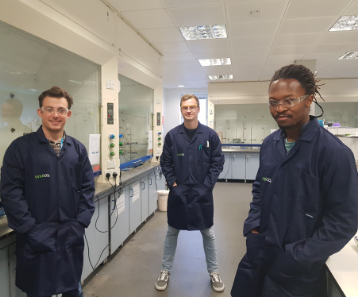Southampton carbon capture technology showcased during global climate change summit

Innovative Southampton technology that can transform carbon dioxide (CO2) into versatile plastic materials such as mattresses, clothes and building insulation has been showcased in the run up to the United Nations Climate Change Conference (COP26) as a ‘promising real solution’ to one of today’s global challenges.
ViridiCO2, a spin-out company based in Chemistry at the University of Southampton, was selected by the Royal Society of Chemistry (RSC) as one of just four UK small and medium enterprises (SMEs) to share their research and showcase the impact innovative SMEs are making to meet net zero targets.
The RSC produced a video about ViridiCO2 that portrays the potential impact of the company’s research and how it aligns with the goal to achieve net zero by 2050. The video was shared ahead of the conference with the intention of influencing world leaders and demonstrating what this novel technology can make possible.
Southampton PhD Chemistry graduate Dr Daniel Stewart, who set up ViridiCO2 with his former supervisor Professor Robert Raja, says: “It was a great honour to be recognised and promoted by the RSC in the build up to COP26. It validates both our technical and commercial approach to bringing about real change in the way chemicals are manufactured globally.
“It also helps to educate people and industry that carbon dioxide is a viable starting material to produce items that are utilised in everyday life, and a solution exists in which we can turn waste into a cheap and abundant resource.”
ViridiCO2 was created to advance research derived from Daniel’s PhD that discovered a way of transforming CO2 under far milder temperatures and pressures than any other technology on the market.
A patented hybrid catalyst platform was developed from this novel technique to provide chemical manufacturers with a route to directly replace fossil fuels with re-purposed waste CO2. The technology can be retrofitted to the output streams of petrochemical refineries to close the carbon loop.
The immense potential of ViridiCO2’s work was recognised by the RSC when it announced the company was the winner of its prestigious 2020 Emerging Technologies Competition.
Since winning the competition, ViridiCO2 CEO Daniel has worked very closely with the RSC via the mentoring initiative that was part of the prize winner’s package and has benefited greatly from its Enterprise Plus programme.
He says: “Through direct access to an experienced engagement manager, we have been recognised as a promising SME that can provide real solutions to the global challenges we face today. Our technology can be applied to chemical and foundation industries in order to reduce their carbon footprint and petrochemical reliance, and shift towards circular products.”
“We are grateful for the support we have received from the University, particularly its startup accelerator Future Worlds. We have won EPSRC Impact Acceleration Award Funding and Innovate UK ICURe follow-on funding, and secured more than £500,000 equity investment. The company has now grown to six people and has been named in TechRound’s top 15 sustainable tech companies.”